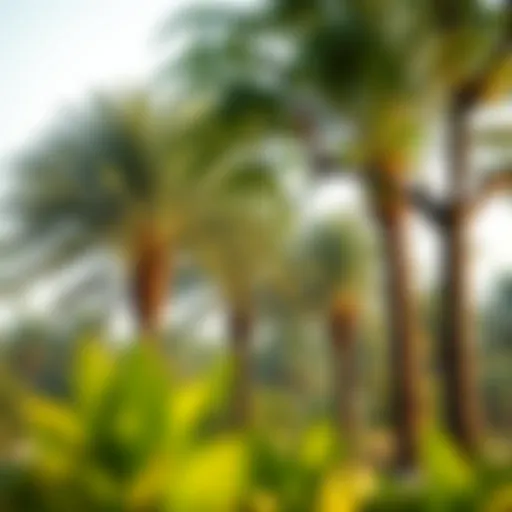The Role of Lemon Blossom in Dubai's Real Estate Growth
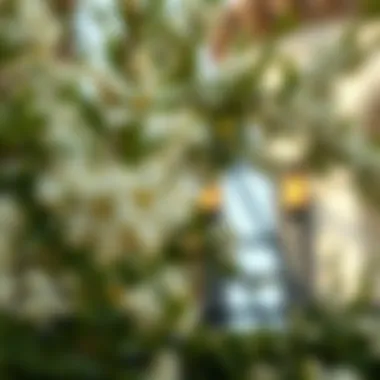

Intro
Lemon blossom, with its distinct fragrance and delicate beauty, is becoming more than just a pleasant sight in Dubai; it's carving a niche within the real estate landscape of the emirate. The integration of such flora into property development is slowly proving its value as a unique differentiator in a bustling market. Amid skyscrapers and opulent resorts, the subtle nuances of nature like lemon blossom are helping to redefine spaces, ensuring that properties resonate more with both buyers and investors.
The interplay between real estate and nature underscores a broader trend where developers are combining greenery with urban settings. This not only contributes to aesthetic appeal but also reflects a growing awareness of sustainability in architectural design. By examining the role lemon blossom plays within this context, we delve into the culture, economics, and investment considerations tied to such vital elements. This article will cleverly unpack various insights and practical strategies for property owners, investors, and homebuyers eager to tap into this natural synergy.
Prologue to Lemon Blossom in Dubai
In recent years, the growth of lemon blossom in Dubai has become more than just a horticultural interest; it has woven itself into the fabric of the city’s real estate landscape. Understanding this aspect is crucial for anyone looking to invest or develop properties in the region. With the unique flora offering a multitude of benefits, the incorporation of lemon blossom can dramatically influence property values, aesthetic appeal, and even cultural significance.
When discussing the Introduction to Lemon Blossom in Dubai, it's essential to note that this isn't merely about gardens and landscaping. Lemon blossoms epitomize a blend of beauty and sustainability, appealing to both potential homeowners and investors alike. Their fragrant blossoms not only beautify surroundings but also symbolize prosperity—one of the core principles underpinning Dubai's burgeoning real estate market. As the city grows, so does the emphasis on the integration of green spaces into urban planning, making the relevance of natural elements like lemon blossom hard to ignore.
Understanding the Cultural Context
Delving into the cultural context of lemon blossom in Emirati society reveals a rich tapestry of meaning and tradition. For Emiratis, the lemon blossom doesn't just represent a plant; it encapsulates values such as resilience and adaptability—traits that resonate deeply in a fast-evolving metropolis like Dubai. The local communities have historically valued citrus fruits for their economic benefits and culinary uses, and lemon trees have long been a staple in many Emirati gardens.
Furthermore, the presence of lemon blossoms can evoke memories of family gatherings or traditional meals, reinforcing their significance beyond aesthetics. The scent of these blossoms often brings nostalgia, connecting the past with the present and solidifying their place in the cultural identity of the region.
The Botanical Characteristics of Lemon Blossom
From a botanical perspective, lemon blossoms (Citrus limon) are not only visually appealing but also remarkably functional. Typically characterized by white or pale pink petals, these blossoms showcase an intricate beauty that charms both the casual observer and the nature enthusiasts alike. They thrive in warm climates, making Dubai an ideal location for their cultivation.
Lemon trees generally grow to be about 10 to 20 feet tall, with their blossoms appearing in clusters. The fruit that follows, bright and tangy, mirrors the vibrancy of the flower itself. Beyond their visual allure, lemon blossoms attract pollinators like bees, thus supporting local ecosystems and enhancing the environment where properties may be developed.
Incorporating these botanical elements into urban designs not only aids in maintaining a healthy ecosystem but it may also enhance the emotional and psychological well-being of residents and visitors. Properties boasting lemon blossoms are not just homes; they become sanctuaries that encourage a connection with nature.
By considering both the cultural significance and the botanical properties of lemon blossoms, investors and developers can appreciate how these elements enrich not only landscaping but also the overall appeal of real estate in Dubai.
Lemon Blossom and Its Symbolism
The symbolism of lemon blossom in Dubai's urban tapestry stretches far beyond just a fragrant flower. In the culturally rich landscape of the United Arab Emirates, lemon blossoms serve as a vibrant beacon of natural beauty and cultural significance. The subtle hues of the blossoms, coupled with their unmistakable scent, signify a variety of values integral to Emirati life and thought.
Cultural Significance in Emirati Heritage
Lemon blossoms hold a special place in Emirati culture, often revered for their connection to prosperity and hospitality. This association can be traced back to traditional Emirati customs, where the presence of plants such as lemon trees is seen as an indication of wealth and good fortune. In numerous households, the lemon blossom adorns the doors of homes and businesses, symbolizing an open welcome to guests.
These flowers, along with the fruit they bear, reflect the values of generosity and community. For individuals involved in real estate or homeowners, planting lemon trees and nurturing their blossoms can be seen as a tribute to cultural heritage, enriching the environment.
Moreover, lemon blossoms appear in various local celebrations and rituals, highlighting their importance in Emirati social customs. Their seasonal blooms align with community festivities, adding an olfactory layer to the events, serving as a reminder of the harmony between nature and society.
Associations with Prosperity and Growth
When it comes to economic prosperity, lemon blossoms resonate deeply within Dubai's real estate sector. The connection between nature and growth is a crucial aspect of urban planning and property investment in the city. By incorporating elements like lemon trees in residential properties, developers create a lush atmosphere that mirrors the burgeoning economic landscape of Dubai.
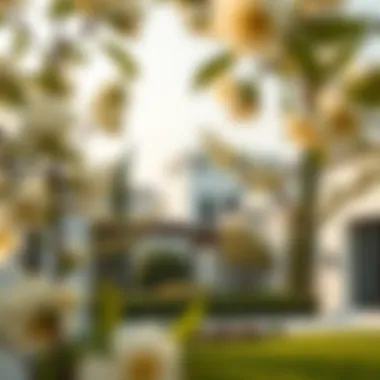

- Natural Aesthetics: Incorporating lemon blossoms into landscaping enhances visual appeal, making properties more attractive to potential buyers.
- Sustainable Growth: Growing lemon trees encourages eco-friendly practices. This is not just about aesthetics; property owners increasingly align themselves with sustainable growth narratives that appeal to modern sensibilities.
- Symbol of Wealth: Investors often view properties with citrus trees as more desirable, indicating a prosperous development that melds nature with luxury living.
In summary, lemon blossoms are an embodiment of the cultural, economic, and environmental values embedded within Dubai's real estate narrative. Their significance extends beyond mere decoration and into the realm of communal identity and future ambitions.
“Lemon blossoms elevate the beauty of any property while holding the essence of our heritage and values.”
For further insights on Emirati heritage and culture, you can explore resources at Wikipedia or Britannica.
Urban Landscaping and Aesthetic Appeal
In the bustling urban environment of Dubai, where architectural marvels seemingly touch the sky, the role of urban landscaping becomes vital to creating a harmonious living space. It goes beyond mere beauty, impacting the psychology of residents, enhancing air quality, and providing necessary green cover that contrasts beautifully against the arid backdrop. Within this context, lemon blossom holds a unique position, as it blends aesthetic pleasure with practical benefits for the real estate sector.
Planting lemon trees adorned with their fragrant blossoms serves as a visual and olfactory delight, attracting not just the eye but also the soul. Nature has a way of soothing, a fact supported by various studies linking greenery to reduced stress levels in urban settings. Adding to this, properties surrounded by greenery tend to command higher prices, making it clear that the landscape is not just a supplementary element but rather a cornerstone in enhancing property value.
Enhancing Property Value Through Nature
When owners consider landscaping, particularly the inclusion of lemon blossoms, they tap into a market trend that recognizes nature’s influence on property values. Properties that boast gardens filled with such ornamental flora are visually appealing and reflect a commitment to sustainability. In many cases, having a lemon blossom tree nearby can impress potential buyers drawn to the notion of an eco-friendly living environment.
"Green spaces can elevate the overall appeal of a property, helping it stand out in a crowded market."
Moreover, the cultivation of lemon trees comes with an added benefit—homeowners may enjoy the fruits of their labor. Fresh lemons at one's doorstep instigate a sense of pride and ownership, which directly influences the emotional valuation of a property.
Design Strategies for Incorporating Lemon Blossom
The incorporation of lemon blossom into real estate can be achieved through careful design strategies to ensure maximum aesthetic and functional benefits.
Choosing Suitable Varieties
When it comes to choosing the right lemon blossom variety, it's essential to consider types that thrive in Dubai's climate, such as the Eureka or Lisbon varieties. These lemons are not only well-suited to the heat but also boast beautiful flowers that add vibrant color to any landscape. The Eureka lemon is particularly popular because it produces fruit year-round, adding aesthetic appeal and practical use all season long. This is a beneficial choice as it combines visual allure with functionality, setting the stage for a unique real estate marketing angle.
Planting Location Considerations
The location where lemon blossoms are planted is just as crucial as the variety. Ideally, these trees thrive in spots that receive at least six to eight hours of sunlight daily, which is typical in Dubai. Placing them near entryways or along driveways can create inviting pathways that welcome visitors, offering both beauty and an aromatic experience. Visibility plays a key role here; carefully considering where to position these trees ensures they serve as a focal point in landscaping while maximizing their enjoyment for residents and potential buyers alike.
Maintenance and Care Practices
Maintaining these trees requires a little know-how but is achievable even for novice gardeners. Regular watering, particularly during the hot summer months, is crucial, yet it should be balanced to avoid root rot. Pruning should also be performed to promote healthy growth and flower production. The cheerful appearance of lemon blossoms can significantly boost a property's charm, inviting admiration. Even with regular upkeep, the low maintenance characteristic of these trees makes them a popular choice for developers and property managers.
Integrating lemon blossoms into urban landscapes reflects a growing trend that values greenery in Dubai's real estate sector. The advantages extend not just to aesthetics but also to enhanced property values and the well-being of residents.
Market Trends Influenced by Natural Elements
When we talk about the real estate market in Dubai, it’s easy to overlook how natural elements like lemon blossom can really shape trends. These organic influences not only touch the aesthetic values but also drive behavior among buyers and investors. As individuals become more conscious of their living environments, they seek properties that offer more than just shelter—they desire places where nature integrates seamlessly into urban life.
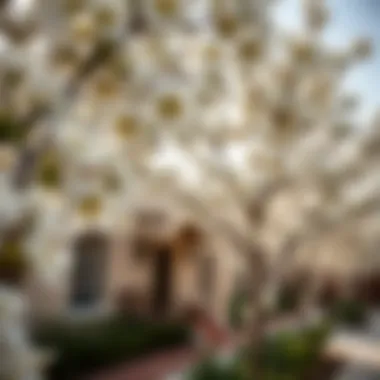

Impact of Green Spaces on Real Estate Demand
The rise in demand for green spaces is no longer just a trend; it has become a way of life for many potential homeowners. In fact, people are drawn to the idea of lush gardens and flowering trees, including lemon blossom, integrated into their living spaces. Growth in urban environments like Dubai leads to the creation of neighborhoods that prioritize parks, gardens, and natural landscapes. This has resulted in a few notable benefits:
- Enhanced Property Aesthetics: Properties that feature green spaces often have visual appeal. Lemon blossoms add a refreshing touch to any garden. Their fragrant blooms and bright yellow fruit can catch potential buyers’ eyes.
- Increased Property Value: Studies have shown that homes in proximity to green spaces tend to command higher prices. The apparent serenity of a property surrounded by greenery, combined with the symbolic ties to prosperity that lemon blossoms hold, could lead to savvy buyers being willing to pay a premium.
- Health and Well-being: Access to nature is strongly linked to mental and physical health benefits. Families searching for a new home often prioritize wellness aspects, making properties infused with greenery, like lemon trees, considerably more attractive.
Investors' Interest in Eco-friendly Developments
The modern investor landscape is shifting. More and more are looking at eco-friendly developments as not merely a trend but a substantial step towards a sustainable future. Here are a few factors contributing to this shifting interest:
- Evolving Consumer Preferences: Buyers are now demanding more than just well-constructed homes. They are searching for properties that reflect their values, specifically those that promote sustainability and environmental awareness. Lemon blossoms can symbolize an eco-conscious community.
- Government Incentives: Many local governments offer incentives for developments incorporating green elements or sustainable practices. This often attracts investors eager to capitalize on reduced tax rates or subsidies.
- Long-term Financial Viability: Eco-friendly developments often show steadier long-term growth and resilience against market fluctuations, driven partly by the increasing demand for sustainable living. Investors see the potential advantages, knowing that properties embedded in nature, such as those with lemon blossoms, might be less likely to experience declines in value.
"The integration of natural elements, like lemon blossoms, is not just about aesthetics; it's about creating a sustainable future that attracts buyers and provides long-term value."
Integration of Lemon Blossom in Real Estate Developments
The integration of lemon blossom in Dubai’s real estate developments isn’t just a nice-to-have; it’s become a key component of modern landscaping. With urban areas ballooning, developers are keen on incorporating natural elements to enhance their projects. This practice not only meets aesthetic desires but serves practical functions, influencing buyer perceptions and investment decisions. The vitality associated with lemon blossoms, coupled with their promising financial returns, makes them an attractive feature in residential and commercial properties alike.
Incorporating lemon blossoms is also a reflection of a broader shift towards sustainability. As urban dwellers seek environments that promote wellness, natural elements like these blossoms create a balance amidst the concrete jungle. The residents are increasingly drawn to properties where nature plays an integral role, believing it fosters a healthier lifestyle. Hence, lemon blossoms symbolize not just beauty but an investment in a property’s long-term viability.
Case Studies of Successful Implementations
Examining several case studies reveals the positive outcomes of using lemon blossoms in property designs. For instance, a well-known luxury condominium the Al Barsha Heights region managed to elevate its property appeal significantly by integrating lemons into its landscape. The project featured lemon trees and blossoming shrubs strategically placed around communal spaces. Buyers responded positively, noting the visually pleasing surroundings and the splendid aroma wafting through the air during bloom season.
Another compelling example can be found in the Jumeirah neighborhood. Here, a sprawling villa development showcased lemon blossom patches interspersed throughout the garden. The developer marketed these gardens as ideal relaxation spots, adding to the property's charm. Many potential homeowners mentioned the gardens were a major factor in their purchase decision, emphasizing the emotional connection sparked through nature.
Successful integration goes beyond mere placement. Good planning and precise maintenance were vital to ensure the resultant beauty translated into increased property values.
Evaluating the Impact on Property Prices
To grasp the financial implications of using lemon blossom in real estate, we must consider how these blooms affect property prices. Properties with well-designed landscapes featuring lemon trees often exhibit notable appreciation. A recent study indicated that homes with flourishing gardens could command a premium, sometimes exceeding 20% compared to those without.
Furthermore, the ecological benefits of lemon blossoms contribute positively to these valuations. Buyers are increasingly making decisions based on the presence of green spaces, leading them towards properties that offer a mix of aesthetic satisfaction and environmental consciousness. Such properties not only appeal to individual homeowners but also attract investors looking for long-term gains in a competitive market.
Challenges in Cultivating Lemon Blossom
Cultivating lemon blossoms in Dubai's unique environment presents a range of challenges that must be navigated to ensure successful growth. The harsh climate, characterized by high temperatures and limited rainfall, demands specific strategies and practices that are essential for both aesthetic appeal and property value enhancement. Understanding these challenges is critical for investors, real estate developers, and homeowners looking to incorporate lemon blossoms into their landscapes.
Climate Adaptation and Soil Requirements
Lemon blossom thrives in conditions that mimic its native environment, which can be difficult to achieve in Dubai's arid climate. The region's summertime heat can reach up to 50 degrees Celsius, making it imperative that this plant is adequately adapted to withstand such extremes. The following are essential considerations for successful cultivation:
- Temperature Management: Lemon trees require a warm climate but not excessive heat. Techniques such as shading young plants during peak sunlight hours can help mitigate stress due to heat.
- Soil Composition: Lemon trees prefer well-draining soils that are slightly acidic. Amending the local sandy soil with organic matter or compost can improve nutrient retention and drainage, creating a more favorable growing environment.
- Irrigation Practices: Given the scarcity of rain, a consistent irrigation plan is crucial. Drip irrigation systems that deliver water directly to the roots can be an effective solution for conserving water while ensuring the trees receive adequate moisture.
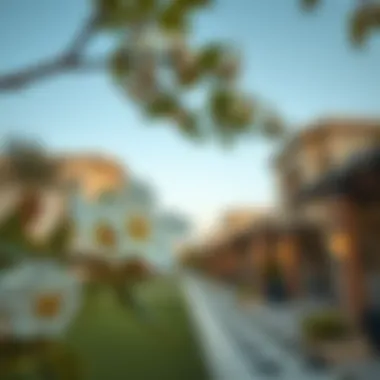

Managing Pests and Diseases
While the lemon tree is relatively resilient, it can fall prey to various pests and diseases that may flourish in Dubai's climate. Proactive management is crucial to maintain the health of these plants and the visual appeal of the landscapes they inhabit. Key pest and disease management strategies include:
- Integrated Pest Management (IPM): This holistic approach combines biological control, cultural practices, and chemical interventions to minimize the impact of pests such as aphids and citrus leaf miners.
- Regular Monitoring: Regular inspections of the trees are vital. Early detection of pests or diseases can significantly reduce the spread and damage, helping to preserve the integrity of lemon blossom cultivation.
- Organic Treatments: Utilizing organic pest control measures, like neem oil, can provide an effective means of keeping pests in check without harming beneficial insects or the surrounding environment.
"The success of lemon blossoms in urban landscapes hinges not only on ideal conditions but also on the effective management of external threats, lest their beauty and benefits be compromised."
Embracing the challenges associated with cultivating lemon blossoms offers an opportunity for significant returns on investment in Dubai's real estate sector. By understanding the specific climate adaptation needs and managing pest pressures effectively, stakeholders can enhance not just the aesthetic charm but also the ecological viability of their developments, setting them apart in a competitive market.
Future Prospects and Developments
As Dubai's real estate landscape continues to evolve, the incorporation of natural elements like lemon blossom represents not just a trend, but a fundamental shift towards sustainability and aesthetic enhancement. This section sheds light on the exciting future prospects and developments that frame the relevance of lemon blossom in urban settings. The push for greener spaces is increasingly linked to economic growth and social well-being, making lemon blossom not just a decorative feature but a vital component of real estate strategies.
Innovations in Urban Greenery
The concept of urban greenery isn’t just about planting trees or shrubs; it encompasses a wide array of innovative practices aimed at integrating nature into the urban fabric. In Dubai, where towering skyscrapers dominate the skyline, the introduction of lemon blossom can serve as a breath of fresh air.
- Vertical Gardens: Innovative vertical gardening systems allow for the cultivation of lemon blossoms on building facades. Such designs not only beautify the structure but also improve air quality and provide insulation, offering a dual benefit to property owners and residents.
- Smart Irrigation Systems: The advancement of technology in irrigation systems facilitates efficient water usage, crucial in Dubai's desert climate. This technology ensures that lemon blossoms thrive with minimal resources, making them sustainable even in harsh conditions.
- Community Gardens: Neighborhoods are increasingly adopting community garden models where residents can grow lemon blossoms together, fostering a sense of community and encouraging healthier lifestyles. By connecting residents to nature, these gardens can also drive property values upward as they enhance the local environment.
"The incorporation of lemon blossom in public spaces can greatly enhance the aesthetic appeal and value of nearby properties, aligning environmental sustainability with economic incentive."
Investing in these innovations not only elevates the appeal of real estate projects but also positions developers as forward-thinking leaders in the market.
Potential for Lemons in Sustainable Architecture
In the quest for sustainable architecture, lemon blossoms present fascinating prospects. Their incorporation into building design goes beyond aesthetic appeal; it also serves practical purposes that align with contemporary architectural goals.
- Natural Cooling: Lemon blossom trees can provide natural shade, reducing the need for artificial cooling in nearby structures. Strategic placement of these trees contributes to lower energy consumption and better thermal regulation of buildings.
- Eco-friendly Materials: Beyond the blossoms themselves, incorporating materials derived from lemon trees, such as lemon wood, can add an innovative touch to interiors and exteriors of developments. This approach not only makes a statement about sustainability but also reduces the carbon footprint associated with materials.
- Biophilic Design: The biophilic design philosophy emphasizes the human connection to nature. By integrating lemon blossoms into real estate developments, architects can create spaces that promote well-being and enhance resident satisfaction.
In summary, the future of lemon blossom integration into Dubai's real estate sector is bright. With ongoing innovations in urban greenery and sustainable architecture, it stands as a symbol for what can be achieved when the environment and urban development coalesce. Investors, agents, and homebuyers should keep an eye on this burgeoning trend, as it signifies not just a love for aesthetics but a commitment to sustainable living that is likely to appeal to a wide range of stakeholders in the market.
Culmination
In wrapping up our exploration of lemon blossom's influence within Dubai's real estate landscape, it's clear that this delicate flower transcends mere botanical interest. Its significance embodies the fusion of nature and urban development, symbolizing hope, growth, and prosperity in a rapidly evolving city.
Summarizing Key Insights
- Cultural Heritage: Lemon blossom reflects much of Emirati traditions and serves as a reminder of sustainable living practices. It resonates with the community's past while navigating present demands.
- Aesthetic Appeal: Integrating lemon blossom into property designs doesn't just enhance beauty. It can significantly elevate the value of real estate by creating inviting and tranquil environments. Many developments showcasing these blooms have seen an uptick in buyer interest.
- Economic Factors: The presence of green spaces, especially those influenced by local flora, tends to drive higher property demand. It’s not uncommon for investors to favor developments accentuated with lemon blossoms, as they symbolize positivity in the local market.
The focus on lemon blossom in urban design can represent a shift towards prioritizing ecological benefits in real estate investments. In a city like Dubai, where space is limited, effectively incorporating elements of nature is not just advantageous; it's essential.
The Role of Nature in Shaping Future Landscapes
As we peer into Dubai's future, the integration of nature through elements like lemon blossom will likely play a vital role. The current trend leans towards sustainable architecture. This shift is not merely aesthetic but also strategic. Investors are realizing that developments that harmonize with the environment appeal to a growing demographic that values green living.
Moreover, creating harmonious landscapes encourages biodiversity and boosts property attractiveness. Urban planners and stakeholders must consider the benefits of incorporating naturally occurring flora to resonate with buyers’ preferences for eco-friendly living.
"Nature is not a place to visit. It is home." – Gary Snyder.
This encapsulates the drive towards making nature an intrinsic part of our lives and living spaces, where lemon blossoms can serve as a central fixture, echoing a broader call for sustainability in urban development.











